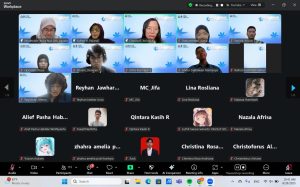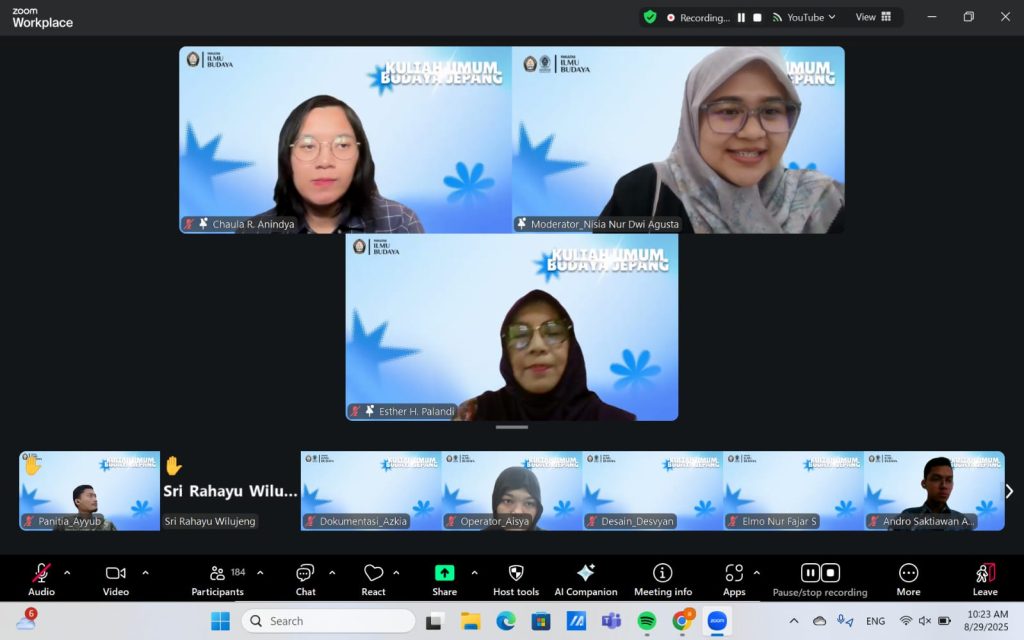On Friday, August 29, 2025, The Undergraduate Program in Japanese Language and Culture, Faculty of Humanities, Diponegoro University held a public lecture themed Japanese Culture, which was conducted online via Zoom Meeting. This lecture featured two competent speakers: Dr. Dra. Esther Hesline Palandi, M.Pd., from Malang State Polytechnic, and Chaula Rininta Anindya, PhD., from the University of Indonesia. With that, this public lecture is expected to facilitate students in making the right decisions regarding their concentration choice, giving more insights regarding Japan’s cultures, and support the writing process of their final projects in a more effective way, then produce high-quality writings.
The event started with the first presentation by Dr. Dra. Esther Hesline Palandi, M.Pd., who discussed “Reflections of Japanese Culture in a Global Perspective.” In this session, Dr. Dra. Esther talked about various aspects of Japanese culture that are still relevant and practiced today. The discussion covered not just traditional and modern culture, but also old norms and habits that are deeply rooted in Japanese society. Some of the concepts she explained included amae, wa, omotenashi, honne and tatemae, also how these customs influence social life in Japan. Dr. Dra. Esther also mentioned that these cultural elements, especially harmony (wa) remains important to this day despite the world being more and more influenced by globalization, not to mention the raging individualism growing in today’s society. But as long as there are communities in the world, these cultures and beliefs will continue to exist, as harmony (wa) is essential for society.

The public lecture continued with the presentation titled “Japan-Indonesia Public Diplomacy: Not a One-Sided Influence,” delivered by Chaula Rininta Anindya, PhD. In this session, Chaula explained the benefits Japan receives from this diplomacy. Japan is very much interested in Indonesia, given its strategic location in the ASEAN region. Indonesia is seen as an important actor that can help communicate Japan’s interests in this area. To achieve this, Japan uses soft power, primarily through modern media and its culture, to attract Indonesian students to continue their study in Japan, which in turn strengthens cultural exchange and ties between the two countries. The main focus of this presentation was the role of Indonesian students in the public diplomacy between Japan and Indonesia. Indonesian students studying in Japan not only introduce Indonesia culture, such as the language and traditional musical instruments, but also gain a deeper understanding of Japanese society. Indonesian students who master the Japanese language are also highly valued in Japan, opening more opportunities to contribute to mutually beneficial cultural diplomacy.
Although there may seem to be differences between the two topics, they are actually connected. Nisia Nur Dwi Agusta S. Hum, M. Si., the moderator, concluded that Japan and Indonesia share more cultural similarities than expected. Students play a very important role in the diplomatic relationship between Indonesia and Japan. However, students should not only be consumers of Japan’s soft power but also have the ability to influence. Indonesia is rich in cultures, people can work on developing and introducing Indonesian culture more widely, so it can stand out more for the world to see.
The public lecture ended with a Q&A session guided by the moderator. The presented materials sparked many questions from the enthusiastic students, which provides an opportunity for sharing insights and deepening their understanding of the discussed topic.


